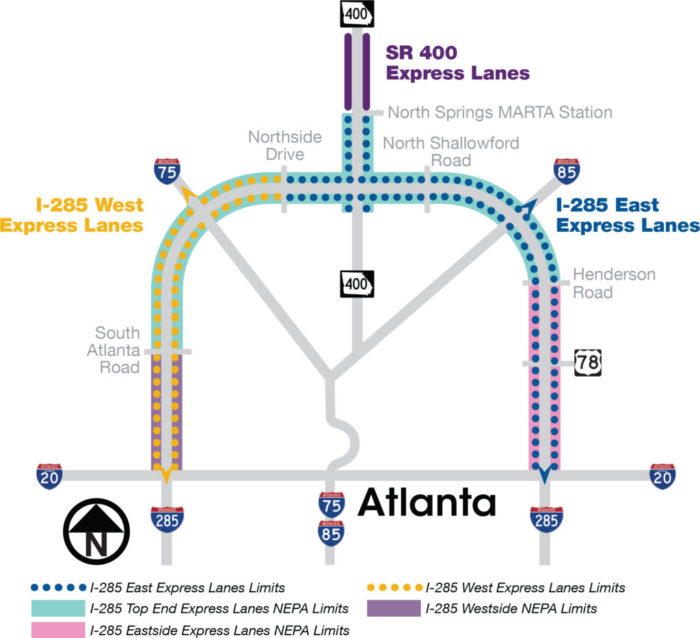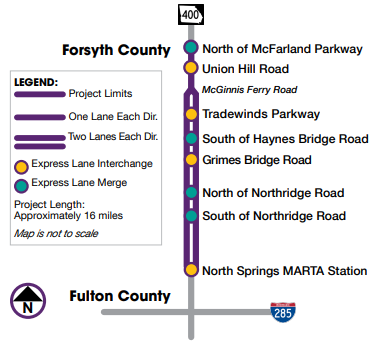A truly historic transportation financing was closed in Georgia in August. The SR-400 project financing sets new records no matter where you look. At $3.32 billion, it includes the largest single Private Activity Bond (PAB) issuance in U.S. history in addition to, at $3.89 billion, the largest TIFIA loan in the program’s history. At $4.7 billion, the project has the highest EPC cost at financial close of any surface transportation P3 in U.S. history. At $3.36 billion, it represents, by a wide margin, the largest private equity investment in a greenfield highway P3 in U.S. history. And last but not least, the $3.8 billion concession fee breaks a record or two as well.
That $12.18 billion financing will now deliver the SR-400 Express Lanes project north of Atlanta. The project will build 16 miles of barrier-separated, dynamically-tolled express lanes along SR-400 and then operate and maintain the system under a 55-year concession.
The project was financed and will be delivered by SR400 Peach Partners, which was selected as the preferred bidder for the project by the Georgia Department of Transportation (GDOT) last year. SR400 Peach Partners is led by Meridiam, ACS Infrastructure, and Acciona Concesiones. The lead construction contractors for the project are Acciona and Dragados. Parsons is the team’s lead engineering firm, and Indra USA is the Toll System Integrator.
The lead underwriters for the SR-400 bond financing were J.P. Morgan, RBC Capital Markets, and KeyBanc Capital Markets. Mayer Brown was legal advisor to SR400 Peach Partners, and Orrick, Herrington & Sutcliffe was bond counsel. Lenders technical advisor was BTY US LLC. The bonds in the financing were rated Baa3 by Moody’s and BBB+ by Kroll.
The SR-400 project will deliver two express lanes along the majority of the 16-mile stretch of highway, and a single express lane along the northernmost mile of the segment. SR400 Peach Partners plans to begin major construction work by the end of July 2026 and complete construction in February 2031. The project is the first express lanes P3 procured under GDOT’s Major Mobility Investment Program (MMIP), a massive project pipeline of highway and interchange procurement projects to alleviate congestion in the greater Atlanta region and along other congested corridors in the state.
The MMIP will include two additional express lane procurements after SR-400: the I-285 East Express Lanes, which is already shortlisted, and the I-285 West Express Lanes, which is expected to begin procurement in the near future. Those two procurements will eventually build barrier separated express lanes from the SR-400 project and along the entire top half of the Atlanta perimeter.
“This innovative P3 approach demonstrates the value of working together with private partners and private capital to deliver landmark projects. Reaching critical-path milestones — most notably securing financial close on schedule – is exceptional,” said Georgia DOT Commissioner Russell R. McMurry.
“Providing travelers options to bypass congestion along this vital corridor has been a statewide priority and part of our state’s long-term plan managed lane system plan. Achieving these milestones on time underscores our team’s resolve and SR400 Peach Partners’ shared vision to improve mobility for both cars and transit, and support Metro Atlanta’s future economic vitality by investing funding from the concession fee back into the SR-400 corridor.”
GDOT is working with a number of advisors on the MMIP express lane procurements. HNTB is the Program Management Consultant. Jacobs is the General Engineering Consultant. Ernst & Young is the Financial Advisor. Ashurst, McGuireWoods and Nossaman are all legal advisors. AtkinsRéalis is the tolling advisor. Ames & Gough is the insurance advisor. C&M Associates is the traffic and revenue advisor.

Big Numbers
Despite the massive development costs of the SR-400 project, much of the industry anticipated that express lanes along that corridor would be economically viable without a public subsidy. In other words, Georgia was expected to get a check, not write one, to deliver the project as a P3.
Still, the scale of the SR-400 concession fee, now that it has actually arrived, was so extraordinary that it has implications well beyond the Atlanta metro area (see this edition).
The SR-400 corridor is notoriously congested, and demand for the express lanes is expected to be strong. Demand for express lane concession contracts is the other important driver of the SR-400 concession’s scale. The United States has a large express lane project pipeline in planning/procurement, and there is a lot of competition for these contracts. SR-400 has confirmed it.
To put that another way, if GDOT would have awarded SR-400 to the runner-up bidder, the financing would have been smaller, but it almost certainly would have broken all of the same records in its scale, including the one for the largest concession fee in U.S. history.
The express lanes pricing for SR-400 is driven by a single key Operational Toll Rate (OTR), which sets soft and hard caps on the dynamic tolling for the express lanes. It starts at $1.83 per mile in 2023 dollars. The OTR is a soft cap on tolling anytime conditions on the express lanes are good. If traffic on the lanes worsens, and speeds drop below 55 miles per hour, the concessionaire can increase tolls up to 2x the OTR, which is the hard cap.
A key driver of the SR-400’s revenue will be OTR escalation over time. The OTR has an annual escalator, but there is also a mechanism that allows for greater increases of the OTR over time if the concessionaire is unable to maintain the free flow of traffic in the express lanes at the current OTR.
So in the end, whether the SR-400 project meets or exceeds its traffic projections will still be primarily driven by demand during those rush hour periods, as that will determine the escalation of the system’s hard and soft caps. Historically, however, rush hour traffic in Atlanta has been a pretty safe bet.

On to the Next Procurement
The team at SR400 Peach Partners now faces the always-challenging task of delivering the project that they just financed. GDOT and its advisors will have little time to celebrate as well, as the next major express lanes procurement in the MMIP is already well underway.
GDOT shortlisted four bid teams for the I-285 East Express Lanes project in February. Unlike the SR-400 project, the I-285 East P3 will have a fixed price “phase 1” P3 component as well as a progressive P3 component that will go through joint predevelopment before fixed pricing. That phase 1 project would develop westbound express lanes from Henderson Road on I-285 to a northbound interconnection with the SR-400 express lanes. Future negotiated extensions could build the same lanes on the other side of the project and extend the system further south on I-285 to I-20.
The shortlisted I-285 East teams are:
East Peach Partners, led by ACS Infrastructure, Meridiam, and Acciona. The team’s phase 1 lead contractors are Flatiron Construction, Dragados, and Acciona Construction. Arcadis is the lead design firm.
East Perimeter Partners, led by Plenary, Sacyr, and Shikun & Binui. The team’s phase 1 lead contractor is a joint venture between Sacyr and Shikun & Binui. WSP is the lead design firm.
Gateway Mobility Group, led by Vinci Highways. The team’s phase 1 lead contractor is a joint venture between Vinci and Dodin Campenon Bernard. The lead designer is a joint venture between COWI North America and Michael Baker International.
Top End Mobility Group, led by Cintra, Transurban and Star America. The team’s phase 1 lead contractor is a joint venture between Ferrovial and Webber. AECOM is the lead design firm.
GDOT’s express lanes program appears ready to continue, with a Request for Qualifications for I-285 West potentially right around the corner.
“SR-400’s financial close is a historic win and underscores GDOT’s national leadership in delivering innovative, revenue-risk express lanes,” said Jim Ray, Corporate President, Advisory at HNTB. “Leveraging this landmark achievement and looking ahead to the I-285 corridor and beyond, Georgia is setting the standard for how large-scale, multimodal mobility programs can be advanced.”



